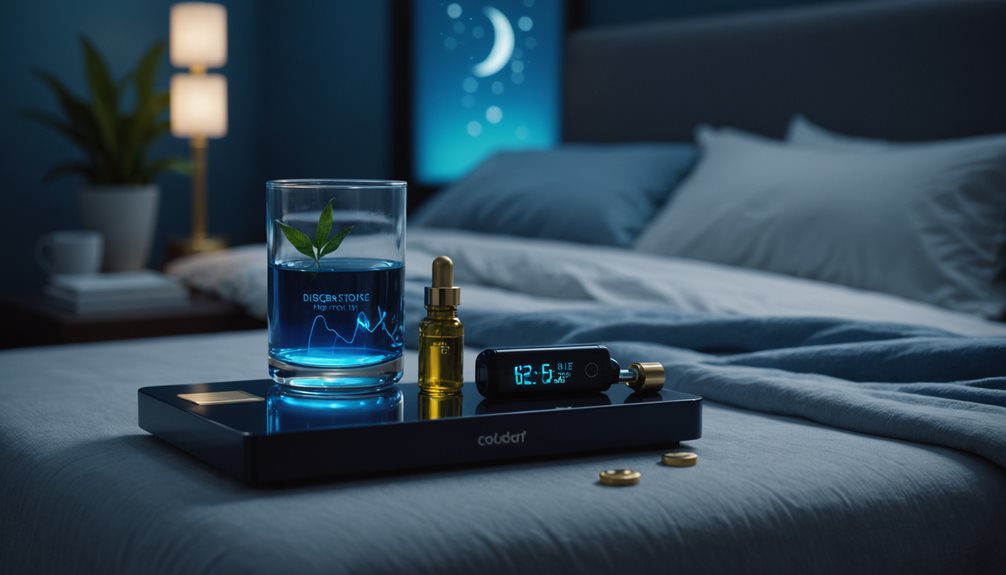If you’re exploring ways to improve your sleep, you’ve likely come across CBD as a possible option. You might wonder if it can influence the quality of your rest, especially when it comes to REM sleep—the stage tied to dreaming and memory. While CBD’s impact on sleep stages is getting attention from scientists, what’s really happening inside your brain isn’t as straightforward as you might think. Let’s peel back the layers together and see what’s truly at play.
Key Takeaways
- CBD can alter REM sleep latency, with lower doses potentially shortening and higher doses possibly delaying the onset of REM sleep.
- Research shows inconsistent effects of CBD on REM sleep, with mixed results across different studies and dosages.
- CBD tends to promote relaxation and may improve overall sleep quality without reliably increasing or decreasing REM sleep duration.
- Animal studies suggest CBD may boost non-REM sleep, but its impact on REM sleep and related memory consolidation remains unclear.
- Individual responses vary, so monitoring effects and consulting a healthcare provider is recommended when using CBD for sleep support.
Understanding REM Sleep and Its Importance

REM sleep is a distinct stage of the sleep cycle characterized by increased brain activity, vivid dreaming, and temporary muscle atonia. This phase is associated with essential cognitive functions, including memory consolidation and regulation of emotions.
As the sleep cycle progresses, the proportion of REM sleep generally increases, ultimately comprising approximately 20–25% of total sleep time in healthy adults.
Sufficient REM sleep is considered important for maintaining normal cognitive performance and emotional stability. Research indicates that inadequate REM sleep may contribute to cognitive impairments and mood disturbances.
Ensuring adequate and restorative sleep is therefore relevant for supporting memory and psychological well-being.
The Science Behind CBD and the Sleep-Wake Cycle
Examining the role of specific sleep stages prompts consideration of how external substances such as cannabidiol (CBD) may affect the sleep-wake cycle.
CBD is reported to interact with elements of sleep architecture; for example, at lower doses, it may decrease REM sleep latency, while higher doses could delay the onset of REM sleep.
Findings from animal studies indicate that CBD can alter sleep characteristics, including increasing the duration of non-REM sleep and reducing certain neural oscillations associated with memory processing during REM sleep.
Although some individuals note improvements in relaxation and subjective sleep quality when using CBD, its effects aren’t consistent across all populations.
Variability in response is influenced by factors such as dosage and the presence of underlying sleep disturbances, suggesting that CBD’s impact on sleep is complex and may differ between individuals.
Current Research on CBD’s Influence on REM Sleep
Current research indicates that cannabidiol (CBD) may influence REM sleep, though findings are inconsistent. The effect of CBD on REM sleep appears to vary based on dosage. Some studies suggest that medium to high doses of CBD can increase REM sleep latency, resulting in a delayed onset of REM sleep.
Conversely, lower doses may facilitate a faster transition to REM sleep. The impact of CBD on overall sleep architecture, including non-REM sleep, also remains unclear, with some reports indicating changes to non-REM periods and potential effects on memory consolidation.
While certain studies note possible benefits for individuals with chronic conditions or sleep disturbances, other research doesn’t observe significant effects. These mixed results highlight the need for further investigation to better understand CBD’s specific influence on REM sleep and sleep patterns in general.
Comparing CBD With Other Cannabinoids for Sleep

When comparing CBD with other cannabinoids for sleep, it’s important to consider their distinct effects on the body.
CBD has been shown to promote relaxation and may contribute to improved sleep quality, though current evidence suggests it doesn’t significantly affect the duration of REM sleep.
THC may reduce the time it takes to fall asleep; however, higher doses of THC are associated with potential disruptions to overall sleep quality and alterations to typical brain wave patterns.
CBN may have a supportive role in sleep, particularly when used alongside CBD, and has shown some potential to enhance non-REM sleep and help regulate circadian rhythms.
Responses to cannabinoids can vary based on individual differences and dosage, indicating that the effectiveness of each compound for sleep may not be the same for everyone.
Practical Tips for Using CBD to Support Restful Sleep
Using CBD to support restful sleep requires attention to how it’s integrated into your sleep routine. Establishing a regular schedule and maintaining good sleep hygiene are important factors to consider in addition to CBD supplementation.
Dosage can influence the outcome; lower doses may have different effects on the sleep cycle compared to medium or higher doses, such as impacting time spent in specific sleep stages like REM.
It’s important to monitor the effects of CBD on your sleep, especially if you have underlying health conditions or sleep disorders. Keeping track of sleep quality and making adjustments based on observed results can help optimize its use.
Consultation with a healthcare provider is recommended to ensure that CBD is used safely and effectively. Approaching CBD use systematically may contribute to improved sleep quality for some individuals.